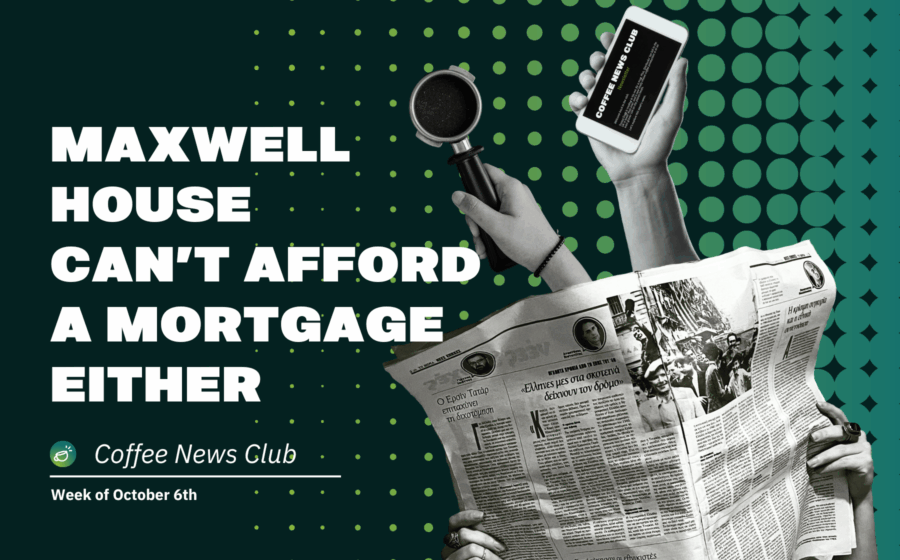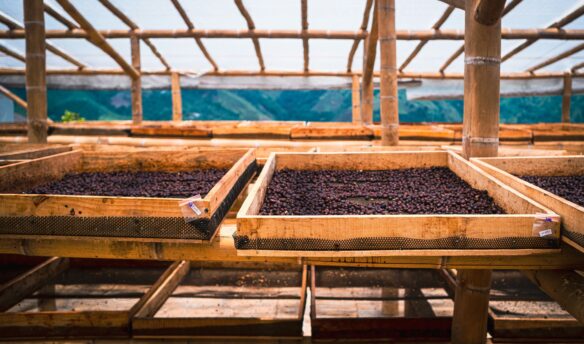Maxwell House is rebranding as Maxwell Apartment because nobody can afford a home anymore. Plus, new Q grader courses are now live, and Coca-Cola takes an L on Costa Coffee.
‘SCA Officially Launches Q Grader Courses Tied to the CVA’ – via Daily Coffee News
The Specialty Coffee Association (SCA) has officially opened enrollment for what it calls its new “evolved” Q Grader program. Some courses are available now, with others scheduled to go live in the coming months.
For nearly two decades, the Q Grader program was managed by the Coffee Quality Institute (CQI) and was responsible for certifying tasting standards for thousands of coffee professionals worldwide. In April, the SCA announced that it was taking over management of the program from CQI, in what the two organizations called “a historic partnership.”
The move aligns the Q professional certification and training program with the SCA’s updated cupping standards, the Coffee Value Assessment (CVA). When announced, the move was met with controversy, as coffee professionals who made a living teaching the old Q course worried that they would lose their livelihoods. Others cautioned that updating the program risked losing a globally shared standard for coffee quality communication.
However, becoming a certified Q Grader is expensive, and classes can cost thousands of dollars. A month after taking over the Q, the SCA announced a new pricing structure designed “to make learning more accessible, affordable, and equitable for coffee professionals everywhere.” Prices vary by country.
The new Q is based on the CVA, which launched in November 2024 to replace the SCA’s legacy cupping form used to evaluate coffee quality. Unlike the old cupping protocol, which relied on a single 100-point score, the CVA aims to give “a holistic picture of a coffee’s unique sensory and affective attributes,” according to the SCA. Following the CVA’s adoption, the SCA struck deals with multiple regional coffee associations to promote the new standards and encourage wider use.
“The Q Grader Program has long served coffee professionals around the world,” said SCA CEO Yannis Apostolopoulos in a press release. “With the addition of the Coffee Value Assessment, our goal is to provide resources that reflect the needs of today’s coffee community and help us work collectively to make coffee better.”
Read more on the new Q course here.
‘Competition Brews in £2Bn Costa Coffee Sale As Bain Capital Places Bid’ – via Private Equity Insights
In early 2019, Coca-Cola purchased British chain Costa Coffee for £3.9 billion (4.9 billion USD). The goal was to give the beverage giant a foothold in the then-booming coffee market. At the time, Costa had nearly 4,000 retail outlets worldwide, in addition to a coffee vending operation, and Coca-Cola sought to diversify its offerings beyond soda.
The investment has not gone great, and now, just five years later, Costa is up for sale.
Coca-Cola is cutting its losses and seeking £2 billion ($2.7 billion) for the entire Costa Coffee brand and its stores. Coca-Cola CEO James Quincey said in July that Costa had “not quite delivered” and was “not where we wanted it to be from an investment hypothesis point of view.”
Costa—the world’s second-largest coffee chain after Starbucks—has attracted interest and bids from several private equity groups, the Financial Times reports. Massachusetts-based Bain Capital is the latest firm to submit a bid.
“Coca-Cola underestimated how capital-intensive and operationally demanding the café business is, compared to Coca-Cola’s traditional concentrate and bottling model,” food and beverage analyst Nandini Roy Choudhury told Food Navigator Europe. Rising costs and slower consumer demand since the onset of the pandemic made things even harder, she added.
Costa’s revenue in 2023 was £1.2 billion. But the company lost nearly £14 million the same year, according to the Financial Times. Despite these troubles, Coca-Cola has taken more than £250 million in dividends since the acquisition.
Read more on the Costa sale here.
‘In This Economy!? Maxwell House Rebrands As Maxwell Apartment’ – via Marketing Dive
Maxwell House, the 133-year-old brand known for its ground coffee that’s “good to the last drop,” is rebranding as Maxwell Apartment. Why? The joke is that most people can’t afford to buy a home.
The temporary name change is an attempt by the storied brand to leverage the twin economic tailwinds of rising coffee prices and housing unaffordability. As Chris Kelly reports for Marketing Dive, “Maxwell House is having some fun with its name and the grim statistics around the possibility of younger generations owning a home in its latest campaign.” Sounds super fun, right?
Buying a home is more expensive than ever, and young people are being increasingly shut out of the market altogether. To help, for a limited time, Maxwell Apartment is offering customers a year’s supply of coffee—consisting of four 27.5 oz canisters, charmingly described in a press release as a 12-month “lease”—for $40 via Amazon.
In the announcement, Maxwell House, which is owned by Kraft Heinz, notes that buying a year’s supply of its coffee could save customers more than $1,000 annually, assuming they stop going to cafes and make coffee at home instead. It’s kind of like when people with houses tell millennials to stop buying avocado toast to save for a down payment. According to NerdWallet, the median down payment is over $70,000, so customers would have to forgo coffee for 70 years before they can buy a house.
The Maxwell Apartment stunt is an example of earned media, or when a brand receives publicity, media coverage, or other exposure without directly paying for it. Earned media campaigns can be a valuable way for small companies to build word of mouth and gain publicity, but they’re also becoming increasingly popular among big coffee brands. To be fair, we’re as guilty of covering this stuff as anyone—we’ve brought you news of Peet’s Chief Cold Brew Officer job posting and Starbucks’ Global Coffee Creator search, among others.
Maxwell House’s campaign seems slightly more sinister, however, cashing in on the housing crisis and rising coffee prices. Retail prices in the United States surged 21% in August compared to the same time last year. At the same time, house prices keep rising, and the average age of a first-time home buyer is increasing: the median first-time homebuyer was 38 years old in 2024, compared to 29 years old in 1980. Clearly, our coffee habits are the problem.
Read more on the Maxwell House “rebrand” here.
More News
‘Best of Yemen Auction Sets New Benchmark Price’ – via Global Coffee Report
‘The Merriam-Webster Dictionary Officially Recognizes “Cold Brew”’ – via Sprudge
‘The Esplorer Cup from Squeaky Splits the Difference of Flavors’ – via Daily Coffee News
‘Brazil Coffee Exports to Us To Fall Further if Tariffs Stay, Cecafe President Says’ – via Reuters
‘Kona Woman Allegedly Earned Millions From Fake ‘100% Kona’ Coffee Beans’ – via Hawaii News Now
The Week in Coffee Unionizing
Last week, Starbucks announced it would close hundreds of stores across the U.S., Canada, and Europe. Of those stores, 59 were unionized, Joanna Fantozzi reports for Nation’s Restaurant News. Starbucks Workers United has been negotiating with the company to ensure that affected workers can either transfer to other stores or accept a buyout.
“While we remain outraged at how callously Starbucks handled these closures, we are proud that we have forced the company to make this process fairer for impacted union baristas,” SBWU spokesperson Michelle Eisen said in a statement.
Before the announcement, SBWU represented just 3% of Starbucks stores; Fantozzi reports that almost 14% of the total closures affected unionized stores.
Affected baristas have two days to decide whether to accept a transfer offer. Unionized baristas are entitled to severance pay even if they decline a transfer offer. “Given the industry-leading offer provided to all affected partners — including reassignment opportunities, where possible, as well as generous severance — we were able to quickly reach an agreement with Workers United to similarly help represented partners through this transition,” a Starbucks spokesperson told Nation’s Restaurant News.
Starbucks has been negotiating with its unionized members for years: the two parties have not yet agreed on a first contract. SBWU has warned that workers could strike if an agreement is not reached. Across the country, unionized workers have participated in practice pickets to pressure the company to finalize a contract. “We are trying to let Starbucks know that our voices should be heard and should be valued,” shift supervisor Hailie Muro told the Los Angeles Times last month.
In Santa Cruz, California, Verve Coffee workers won their union election. Not a single person voted “no.”
Employees filed to unionize on Labor Day, citing a need for higher wages, improved benefits, and more decision-making power. Verve declined to voluntarily recognize the union, so an election was scheduled.
“With high turnout and no one voting no, we have won our union election at all 3 cafes!” the union wrote on Instagram. “This win belongs to every single one of us that believed in what we could do together.”
Is Coffee Good For You?
A new review by researchers in Mexico examined decades of studies to assess the impact of coffee consumption on the liver. They found that coffee can reduce the risk of developing liver-specific diseases, as well as the most common form of liver cancer.
For the study, published in the journal Biochemical Pharmacology, the team collated research from around the world going back decades. They reviewed studies investigating the bioactive compounds in coffee, such as caffeine, chlorogenic acids, and polyphenols, and examined the compounds’ antioxidant, anti-inflammatory, and metabolic effects.
Across the board, the study found that regular coffee consumption was linked to a reduced risk of liver problems. For example, coffee drinkers had a 29% lower risk of developing metabolic dysfunction-associated steatotic liver disease, the most common chronic liver condition. Additionally, coffee consumption resulted in a 40% reduction in the risk of developing the most common form of liver cancer, hepatocellular carcinoma.
Those who drank three or more cups of coffee daily saw the best results. The authors note that their findings are observational, and because the studies reviewed were so diverse in their approaches, it is difficult to draw definitive conclusions. Nonetheless, they write that, “Given its low cost and high availability, coffee could represent a simple and viable dietary intervention in the management of liver diseases, especially in high-risk populations.”
Beyond the Headlines
‘Detroit’s Black-Owned Coffee Businesses Aim To Reclaim the Bean’ by Lyndsay C. Green
‘Valencia Is Brewing Its Own Identity in Spain’s Specialty Coffee Scene’ by Isabelle Mani
















